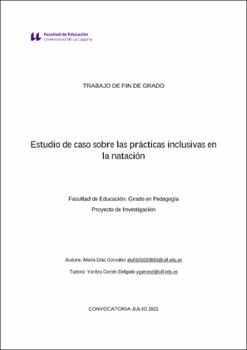Estudio de caso sobre las prácticas inclusivas en la natación.
Autor
Díaz González, MaríaFecha
2021Resumen
Este Trabajo de Fin de Grado tiene como objetivo presentar un proyecto de investigación con
la finalidad de conocer si se realizan entrenamientos inclusivos en el Club Agrupación
Deportiva Santa Cruz, y hasta qué punto estos son adaptados por los distintos técnicos del club.
Se ha realizado un estudio de caso con tres entrenadores/as (informantes claves) y tres
nadadores/as con discapacidad intelectual (informantes secundarios) del Club. A través de una
metodología mixta se han utilizado técnicas e instrumentos de recogida de información
cuantitativos y cualitativos; se han realizado entrevistas semi-estructuradas en profundidad y
un cuestionario para contrastar los datos de los informantes claves. Además, se implementó un
cuestionario con la finalidad de contrastar los datos. Los resultados advierten que la Agrupación
cuenta con un programa de inclusión social para favorecer la práctica deportiva de los
nadadores/as con discapacidad intelectual. En este sentido, en el desarrollo de los
entrenamientos se identifica la existencia de variables que condicionan el proceso de estos,
siendo: el número de nadadores/as por grupo de trabajo, la edad y las características
individuales de cada uno/a de los/as deportistas. Las posibles vías de estudio que se abren con
este TFG son investigar sobre las diferentes vías de inserción social y deportivas de las personas
con discapacidad intelectual en los clubs de alto rendimiento. The aim of this Final Degree Project is to present a research project with the aim of finding out
whether inclusive training sessions are carried out at the Club Agrupación Deportiva Santa
Cruz, and to what extent these are adapted by the different coaches at the club. A case study
was carried out with three coaches (key informants) and three swimmers with intellectual
disabilities (secondary informants) from the Club. Using a mixed methodology, quantitative
and qualitative data collection techniques and instruments were used; semi-structured in-depth
interviews and a questionnaire were carried out to contrast the data from the key informants. In
addition, a questionnaire was implemented in order to cross-check the data. The results show
that the Association has a social inclusion programme to favour the sport practice of swimmers
with intellectual disabilities. In this sense, in the development of the training sessions, the
existence of variables that condition the training process is identified, being: the number of
3
swimmers per work group, the age and the individual characteristics of each of the
sportsmen/women. The possible avenues of study that open up with this dissertation are to
investigate the different ways of social and sporting insertion of people with intellectual
disabilities in high performance clubs.





